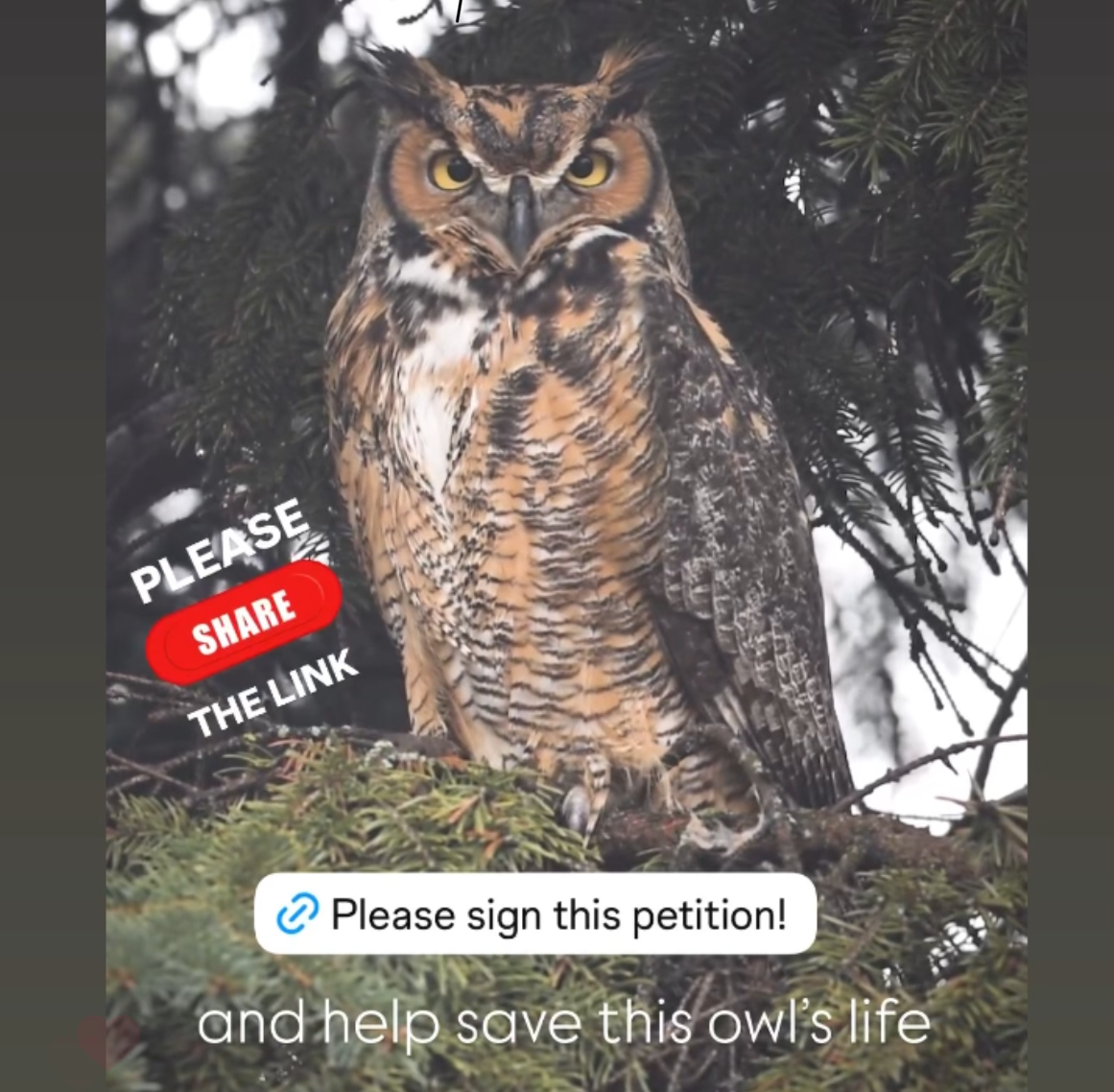photo: Audrey Vicks
Two things you can do to help save owls and hawks from rodenticide poisoning:
Sign our petition and share it in your groups and with your friends.
2. Write a letter to the mayor or your City Council Rep. Let us know if you get an answer.
here’s a sample letter to alders:
Dear Alderperson[Last Name],
I request that you support reducing the City’s rodenticide budget by 20% and, instead, allocate those funds to other methods of rat control that are non-toxic to other animals.
For fiscal year 2025, Chicago proposes to allocate $14,619,241 for rat control. Though it allocated even more funds last year ($14,954,885), this past October, Chicago was named the “rattiest city” in the U.S. by Orkin for the 10th year in a row. Chicago has long relied on rodenticides to kill rats, an approach that scientists have shown is not an effective way of controlling rat populations. This research is summarized on the website of the Audubon Society’s Chicago chapter, the Chicago Bird Alliance:
While rats continue to thrive in Chicago, rodenticides enter the environment, resulting in the unnecessary and unintended deaths of other animals in the ecosystem, including birds. In spring 2024, we saw the devastating impact of these poisons when three Great Horned Owls in Lincoln Park died due to rodenticide poisoning. The adult pair and their owlet were beloved by the community and their presence in the park was a sign of a healthy habitat. Their untimely deaths could have been prevented if rodenticides had not been artificially introduced into the environment (see https://chicagobirdalliance.org/blog/2024/8/17/the-impact-of-rodenticides-on-birds).
Other, less harmful methods of rat control are more effective. The Notebaert Museum, for example, strongly supports the improved sanitation measures described on the Chicago Bird Alliance’s website. These measures include large-scale deployment of rodent-excluding trash receptacles throughout the city, increased sanitation pick-up, and the integration of targeted CO/CO2 use in rat burrows where it is necessary. The continued presence of rat attractants needs to be addressed.
I ask that you allocate 20% of Chicago’s 2025 rodenticide budget allocation toward pursuing these alternate solutions, rather than continuing to fund poisons which only cause harm to owls and other animals and fail to control the city’s rat problem. Please incentivize the Bureau of Rodent Control to think creatively and make Chicago a better habitat for humans and wildlife alike.
Regards,
[fFull Name]
[Address]
[Phone number]
[Email address]
Here’s what we sent to the mayor:
The Honorable Brandon Johnson
Office of the Mayor
121 N LaSalle Street
Chicago City Hall 4th Floor
Chicago, IL 60602
October 29, 2024
Re: 2025 Chicago Budget - Reduce Funding for Rodenticide
Dear Mayor Johnson,
The Chicago Bird Alliance is a chapter of the National Audubon Society that covers the City of Chicago. We have over 4,500 members. We write to request that you reduce the City’s rodenticide budget by 20% and use those funds instead for pilot studies of rodent contraceptives, carbon monoxide, and/or other methods of prevention and deterrence.
In fiscal year 2024, Chicago allocated funds for rodenticides to the Bureau of Rodent Control - and on October 21, 2024, Chicago was named the “rattiest city” by Orkin for the 10th year in a row. Science shows that rodenticide is not effective in controlling rat populations. While rats continue to thrive, rodenticides enter the environment and result in the unnecessary and unintended deaths of other animals in the ecosystem, including birds. In spring 2024, we saw the devastating impact of these poisons when three Great Horned Owls in Lincoln Park died due to rodenticide poisoning. These owls were beloved by the community and their presence in the park was a sign of a healthy habitat. Their untimely deaths could have been prevented if rodenticides were not artificially introduced into the environment.
Other, less harmful, methods of rat control are much more effective. A neighborhood in Seattle has worked with contraceptives to reduce rat populations before they get out of control and without needing to introduce poison into the environment. Evanston has worked with carbon dioxide which also controls populations without poison. More information and a sample policy can be found on our website.
We ask that you please put 20% of Chicago’s 2025 rodenticide budget allocation toward pursuing these alternate solutions, rather than continuing to fund poisons which only cause harm to owls and hawks and do nothing to control the city’s rat problem. Please incentivize the Bureau of Rodent Control to think creatively and make Chicago a better habitat for humans and birds alike.
Regards,
Judy Pollock, President
Dana Harbaugh, Chair
Advocacy Task Force
Chicago Bird Alliance
CC: Cole Stallard, Commissioner, Department of Streets and Sanitation
Members of the City Council

